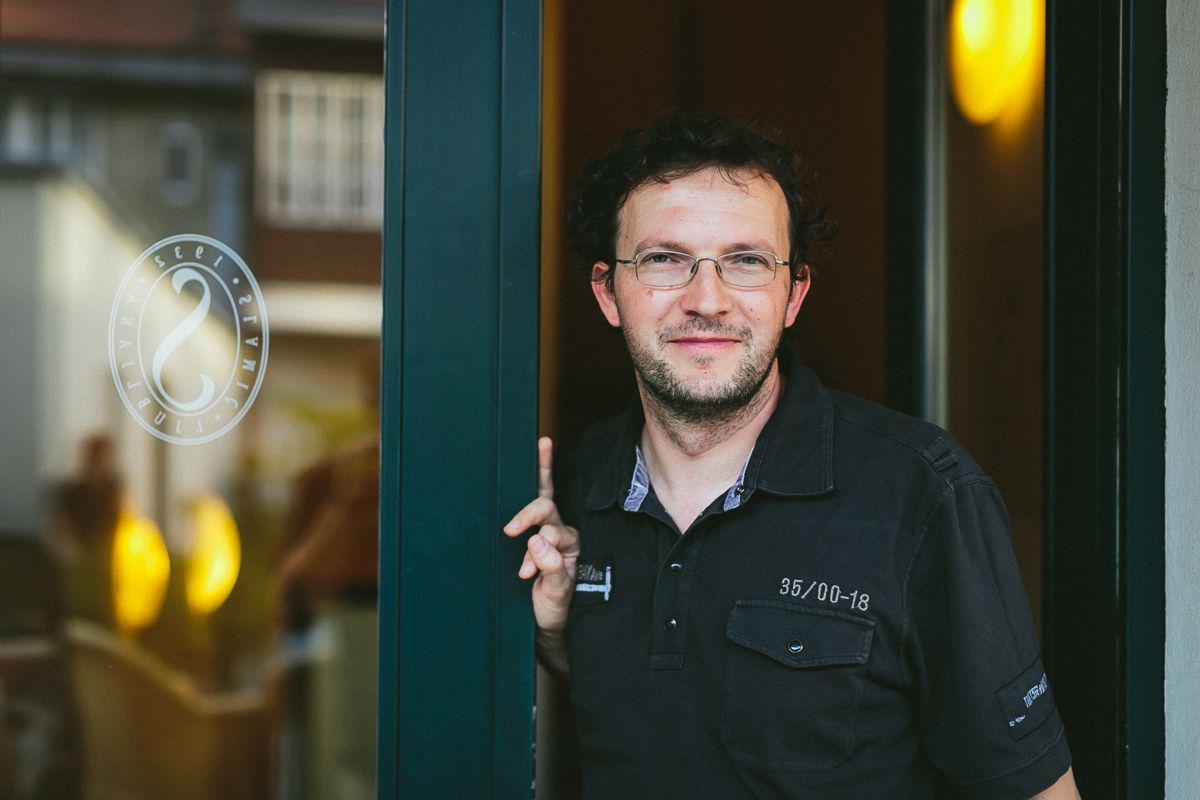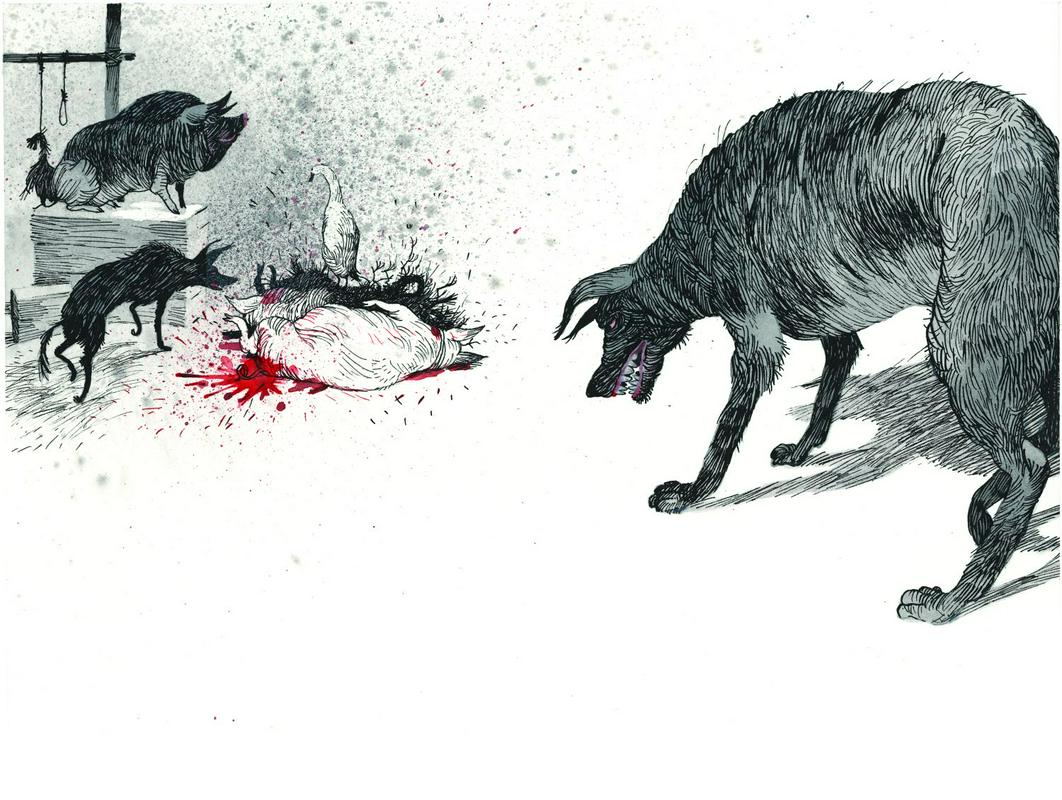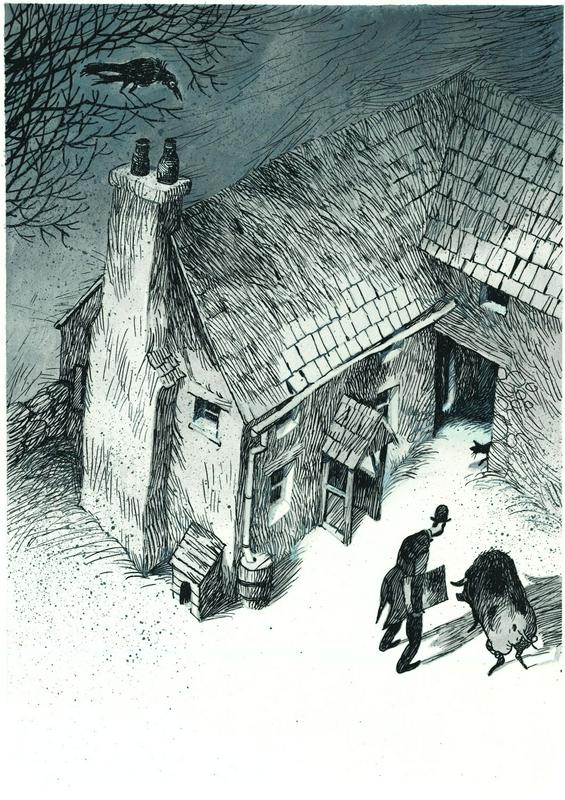
Our assumptions of "stupid chickens", and similar, are grave underestimations of animals.

We are facing a great challenge: we have brought the world to pieces, which the nature showed by recent tragedies in the Balkan Peninsula and in the other parts of the world. We crossed the boundary line with industrialisation. We need to change not only the system, but our way of thinking.

He was a great observer, and he understood that every system had its disadvantages. A labile person doesn't need much to crumble. The depth of Orwell has to be accepted as a whole – not only those parts which comply with a certain interpretation.
"The actual details of the story did not come to me for some time, until one day (I was then living in a small village) I saw a little boy, perhaps ten years old, driving a huge cart-horse along a narrow path, whipping it whenever it tried to turn. It struck me that if only such animals became aware of their strength we should have no power over them, and that men exploit animals in much the same way as the rich exploit the proletariat," wrote George Orwell in his preface to the Ukrainian Edition of his "fairy tale" Animal Farm, as he named it. The literary critic read the short novel for a long time as a criticism of the Stalin totalitarianism, which was confirmed by the author as well - but actually the dark moral of the story on animals which carried out a revolution against exploitative people only to turn themselves into cruel executioners of their peers complies with any abuse of power disguised as endeavours for a better future for all.
Therefore the decision of Mladinska knjiga to reissue the two literary classic works, timeless, "angry", and with political connotations: Farmhand Jernej by Cankar, and Animal Farm by Orwell. For the second Peter Škerl made 24 original black-and-white illustrations. He does not hide the fact that the book is illustrated (also) to attract younger, more visually oriented readers. Which however does not mean that the book turned into a picture book for children: modernized Animal Farm, after two years of preliminary preparations, resulted into an uncompromising confrontation with the cruel reality of the tyrannical pigs/people, which/who usurped the power and the fruits of the joint work through slogans. Yet it should not be understood as criticism of a single social order; that would be simplifying. You can learn more from the interview below.
The new issue of Animal farm is characterised by „the visual analogy with the British manner of writing“, if I recap the words of Pavle Učakar. Could you give us a detailed explanation?
We wished to give the book, and the animals in it, a British atmosphere, at least on first sight, when you start with the book. Later everything revolves around relations. We wanted to make it clear that the story was located at the British countryside; in this way it was possible to avoid all the stereotypes connected with the story, starting with the allusions on the Soviet Union. I believe Orwell had in mind not only the Soviet Union, but also the capitalistic society which was at that time in strong development. He gave a very detailed description of the farm, but his casual remarks (e.g. on the farmer who drank himself to death »somewhere out there«) make it clear that the communist alternative social order gave no better perspective.
Orwell is constantly holding the mirror for every society. Any ideal leading to an individual social order at a certain point disintegrates, and crumbles. Throughout history there are two systems fighting for supremacy: capitalistic, which suits humans because of their greed, and socialistic, which comes forward after we start looking towards social topics, being fed up with the extremes of capitalism.
Does illustrating of books for adults demand different orientation than illustrating stories for children?
I make no differences. You are led by the text. Quite often people think that anything is good for children, but actually I believe that it is extremely important to offer to children books with superior quality illustrations. If nothing else, it gives them aesthetic orientation for future, so that they will be able to look differently at individual art solution as grownups. I always tried to 'infiltrate' something adult in illustrations for children. After all, Orwell could be read by a child, although some parts are rather cruel.
Did you have full freedom at that project, could you chose by yourself the passages of the story which »deserved« an illustration most of all, or was the decision reached through negotiations and coordination with the editor?
The editor Andrej Ilc and I have known each other for ten years. He only suggested the illustrations should be in black-and-white, while I was given free rein in choosing the motives. I tried to connect the 24 illustration with a common thread: if an illustration showed a cause for an action, the next should show its consequence. I emphasized some of the details Orwell mentioned in passing – e.g. Major the pig hid puppies in the attic with the intention of raising them his way. I left the beginning of the final, tenth chapter, quite open – I wanted to let the reader make his own picture of the situation on the farm, and then I only sharpened the absurdity of interlacement of animal and human characters.
As a layperson I would say that one of the biggest challenges for the illustrator of Animal Farm would be the anthropomorphism of animal characters: some of the animals (pigs) must gradually acquire human traits, while the others must remain firmly within the animal kingdom. What was the hardest nut to crack, when defining your approach at the very start?
I wanted animals to remain animals. I was only in doubt regarding the violent scenes in the middle of the story. When using animal characters everything looks gentler. If you add a human character, everything becomes much more cruel. Therefore I added a snarling dog. I gradually introduced more changes for certain animals, and less for some others. In pigs I stressed their gradual gain of weight – they were practically bursting from the comfort the system offered to them.
Do you have any favourite motive? Do you prefer animals, children characters, scenes from nature with innumerable details?
I am interested in everything I haven't tried yet. This time I concentrated on animals, although I have always been attracted to human figures. A person with his/her expressions and wrinkles carries within the traces of time. I was always most interested in those people who were the most weird, different, who had a certain charisma. Even as a child I didn't fear tramps, Roms, or dead people. Once I went to the Žale cemetery with my mother, and I entered the chapel of rest and pinched the nose of the deceased lady – it was so long … I like to step to the brink of the precipice.
Which character could be your "spiritual animal"?
I tried to avoid that with Animal Farm. The animal characters are presented in a rather stereotype manner, perhaps with the exception of Benjamin which is supposed to make any mistake only once. As frequent in fables, you can find some of the human traits in cats, dogs, sheep which always bleat in the same manner…
But we always try to keep our distance to animals, although we have never really understood them. In the drama adaptation of Animal Farm I found very interesting the scene in which the farmer Jones and his colleagues eavesdrop on the animals: while the pigs speak to each other quite coherently, the people on the other side of the line hear only grunts. Our assumptions of »stupid chickens«, and similar, are grave underestimations of animals. It pains me that so many animals are killed in meat industry, and how much meat goes bad. On the other hand we are outraged when Napoleon at the farm sentences to death a couple of pigs and a goose, and forget how often it happens every day at the butchers'! We almost feel we should root for the animals which rebel against the exploitative system.
Our assumptions of "stupid chickens", and similar, are grave underestimations of animals.
We are facing a great challenge: we have brought the world to pieces, which the nature showed by recent tragedies in the Balkan Peninsula and in the other parts of the world. We crossed the boundary line with industrialisation. We need to change not only the system, but our way of thinking.
He was a great observer, and he understood that every system had its disadvantages. A labile person doesn't need much to crumble. The depth of Orwell has to be accepted as a whole – not only those parts which comply with a certain interpretation.

































































